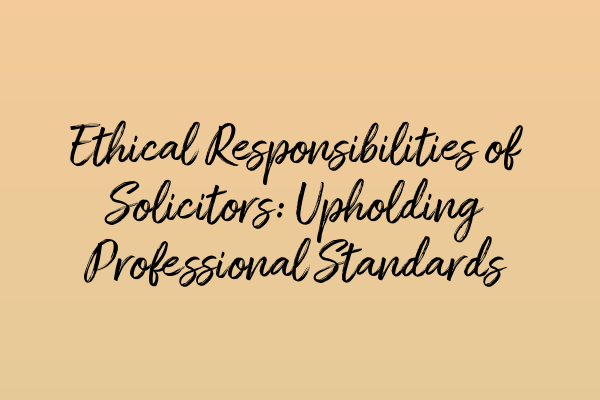Ethical Responsibilities of Solicitors: Upholding Professional Standards
As a solicitor, it is vital to understand and uphold ethical responsibilities in order to maintain and enhance the integrity of the legal profession. Solicitors play a crucial role in the administration of justice, advocating for their clients and providing legal advice and representation. In this blog post, we will explore the ethical responsibilities of solicitors and highlight the importance of upholding professional standards.
1. Duty of Confidentiality
One of the fundamental ethical responsibilities of solicitors is maintaining client confidentiality. Solicitors are bound by a duty to protect the interests and confidences of their clients. This duty of confidentiality extends beyond the solicitor-client relationship and continues even after the relationship has ended. Confidentiality ensures that clients can trust their solicitors to handle their legal matters with discretion and professionalism.
It is essential for solicitors to exercise caution when discussing or disclosing client information. Breaching confidentiality can not only lead to professional misconduct but also damage the client’s trust and compromise the integrity of the legal system. Maintaining client confidentiality is crucial in establishing a strong solicitor-client relationship based on trust and transparency.
2. Conflict of Interest
Solicitors have an ethical duty to avoid conflicts of interest. A conflict of interest arises when a solicitor’s personal, financial, or other interests conflict with the interests of their client. It is essential for solicitors to identify and address any potential conflicts of interest to ensure their loyalty and commitment remain solely with their clients.
If a conflict of interest arises, it is the solicitor’s duty to disclose it to their client and take appropriate steps to mitigate or avoid the conflict. Failing to do so can result in a breach of professional ethics and compromise the solicitor’s ability to provide unbiased and objective legal advice.
3. Professional Competence and Development
Solicitors have a duty to maintain and enhance their professional competence. The legal profession is constantly evolving, with new laws, regulations, and precedents shaping the practice of law. It is crucial for solicitors to stay updated and informed about developments in their field to provide accurate and effective legal advice to their clients.
Continuing professional development (CPD) is a way for solicitors to fulfill their ethical obligation to professional competence. By participating in relevant training, courses, and seminars, solicitors can sharpen their skills, deepen their knowledge, and stay abreast of changes in the legal landscape. CPD not only benefits the solicitor but also ensures that clients receive the highest standard of legal representation.
4. Professional Conduct and Ethics
Professional conduct and ethics are the foundation of the legal profession. Solicitors are expected to adhere to a strict code of conduct that sets out the standards of behavior and ethics expected of them. Upholding professional conduct and ethics involves acting honestly, with integrity, and in the best interests of the client.
It is essential for solicitors to communicate effectively with their clients, provide honest and accurate advice, and act in a respectful and courteous manner. Professional conduct encompasses maintaining client trust, treating all parties involved in legal matters fairly, and avoiding any behavior that could bring the legal profession into disrepute.
5. Access to Justice
Solicitors have a critical role in ensuring access to justice for all individuals, regardless of their background or financial status. Upholding professional standards includes promoting equality and fairness in the legal system and advocating for the rights and interests of vulnerable individuals.
To better understand the importance of access to justice, it is worth reading our related article on Demystifying Criminal Law Procedures: A Step-by-Step Guide. This article provides a comprehensive overview of criminal law procedures and highlights the steps involved in criminal cases.
Additionally, solicitors have a responsibility to protect the rights of the accused and ensure a fair trial. Our article on Rights of the Accused: Protecting Individual Liberties in Criminal Proceedings delves into the rights individuals have within the criminal justice system and sheds light on the legal safeguards in place.
Conclusion
Upholding ethical responsibilities is paramount to maintaining the integrity and professionalism of the legal profession. Solicitors have a duty to protect client confidentiality, avoid conflicts of interest, continuously develop their professional competence, adhere to professional conduct and ethics, and champion access to justice.
A deep understanding of ethical responsibilities ensures that solicitors provide the highest standard of legal representation and act in the best interests of their clients and the legal system as a whole. By upholding professional standards, solicitors contribute to the proper administration of justice and play a vital role in serving the needs of their clients.


Leave a Reply